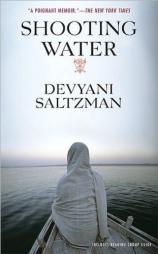Reading Group Guide
Discussion Questions
Shooting Water: A Memoir of Second Chances, Family, and Filmmaking

1. Discuss the parallel struggles of making the film and the relationship between Devyani and her mother, Deepa. Can you relate to difficult parent/child dynamics in your own life?
2. When production began in Benares, riots erupted and protestors even burned Deepa's image in effigy. Can you remember any other films that have elicited such a fervent response?
3. Throughout the memoir, Devyani discusses her feelings of displacement, of being caught between two cultures, two households. Have you ever experienced anything like this in your own life? What are the pros and cons of being from a multi-cultural household? What do you think Devyani would say are the pros and cons?
4. The film Water details the experience of three Hindu widows in 1938 India --- women who after the deaths of their husbands must live a life of "ascetic" mourning. Had you ever heard of these practices prior to reading Shooting Water? Compare and contrast them to the Western rites of grieving.
5. Deepa struggles to get her film made, and Devyani struggles to win Vikram's love as well as repair relations with Deepa. How are these struggles alike? How are they different?
6. How would you characterize the relationship between Devyani and Vikram? Do you think her parents' painful divorce carries over into her personal relationships? In what ways?
7. Devyani writes, "Film was my second language, even before Hindi.... It was the common culture both my parents had raised me in, beyond being Jewish or Indian." What appeals to Devyani about the process and the world of filmmaking?
8. What do you think of Devyani's parents and how they handled their divorce, with regards to their daughter? Could the situation have been handled any differently? How so?
9. Have you ever seen an Indian film? Now that you've read a behind-the-scenes account of Water, would you like to see the finished film? Are you inspired to see other Indian films?
10. Saltzman quotes Pavan K.Varma with "All nations indulge in a bit of mythmaking to bind their people together." How does this relate to the production of Water? Do you think the same is true about the United States? Many successful Western films detail the oppression of a few by the many. Why do you think it's different in India?
11. The production of Water coincided with important elections in both India and Sri Lanka, and most of the problems the then ruling government had with the film was its depiction of a portion of Hindu life that went against their new platform and image of "India Shining." Do you think that films should depict life as it is or how it should be? Can films be used as a means of social change?
Shooting Water: A Memoir of Second Chances, Family, and Filmmaking
- Publication Date: September 7, 2007
- Paperback: 304 pages
- Publisher: William Morrow Paperbacks
- ISBN-10: 1557047855
- ISBN-13: 9781557047854






